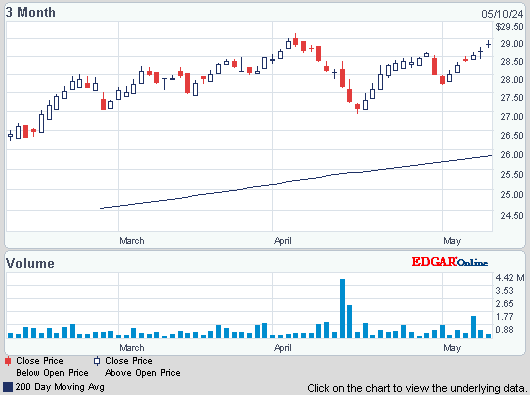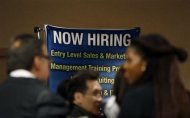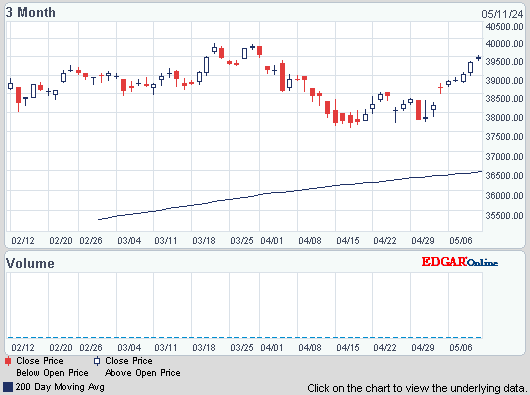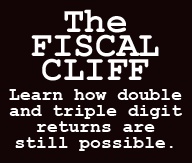Dow fell 73, decliners over advancers 2-1 & NAZ lost 14. The Financial Index dropped 2 to the 218s. The MLP index slipped a fraction to below 381 & the REIT index lost a fraction in the 265s. Junk bond funds were weak & Treasuries rose. Oil & gold were flattish from the confusion relating to the fiscal debate.


Photo: Yahoo
The number of Americans filing new claims for unemployment aid fell last week to nearly its lowest level in 4½ years, a possible sign that employers have picked up the pace of hiring. Initial claims for unemployment benefits dropped 12K to 350K according to the Labor Dept. The prior week's figure was revised to show 1K more applications than previously reported. After spiking in the wake of a mammoth storm that ravaged the East Coast in late Oct, weekly new claims have now dropped to their lowest levels since the early days of the 2007-09 recession. The 4-week moving average fell 11K to 356K, the lowest since Mar 2008. Companies in recent months have been adding to their payrolls at a lackluster pace, & analysts expect the monthly employment report due on Jan 4 will show 143K jobs created in Dec, down from 146K in Nov. While the report on jobless claims had a positive tone, it also included a caveat, at least for the latest week. Obama declared Mon a holiday for federal workers. Many state offices followed suit & were unable to provide complete data for last week's jobless claims. Data for 19 states had to be estimated. Continuing claims fell 32K to 3.2M.
Gov borrowing will hit the debt ceiling on Mon according toTim Geithner. As a result, the Treasury will soon start using what it calls "extraordinary measures" to prevent government borrowing from exceeding the legal limit, he wrote. On Mon, debt subject to the limit was just $95B below the $16.394T debt ceiling. All told, the extraordinary measures can create about $200B of headroom under the limit, normally about 2 months worth of borrowing. But it's unclear how much time the extraordinary measures can buy now because there are so many unanswered questions about tax & spending policies, Geithner said (referring to the lack of any resolution of the fiscal cliff). "If left unresolved, the expiring tax provisions and automatic spending cuts, as well as the attendant delays in filing of tax returns, would have the effect of adding some additional time to the duration of the extraordinary measures," he wrote. After the extraordinary measures run out, Treasury won't be able to pay all the country's bills in full & on time & the US will run the very real risk that it could default on some of its obligations. Now there's a good chance the debt ceiling issue won't be resolved until the last minute & only after an ugly fight. The last standoff over the debt ceiling in 2011 ended badly, with Congress raising it only at the last minute. The debacle led to the downgrade of the country's AAA credit rating & caused tumult in the markets. The Government Accountability Office has long called for Congress to come up with a smarter way to handle the debt ceiling.

Photo: Bloomberg
Confidence among US consumers declined more than forecast in Dec as the budget debate soured Americans’ outlook for the economy. The Conference Board index of sentiment fell to 65.1 from a revised 71.5 reading the prior month. The gauge was projected to fall to 70. A drop in consumer expectations for the next 6 months to a one-year low coincides with mounting concerns about looming tax increases & gov budget cuts in 2013 that threaten the expansion. At the same time, employment gains, rising home values, & lower gas prices may keep spending from foundering. Estimates ranged from 62.6 - 79. The measure averaged 53.7 during the recession that ended in Jun 2009. But the Conference Board’s measure of present conditions climbed to 62.8, the highest since Aug 2008 (prior to the Lehman collapse), from 57.4 in Nov. The gauge of expectations for the next 6 months decreased to 66.5 from 80.9. The percent of respondents expecting more jobs to become available in the next 6 months decreased to 17 from 19.5 in the previous month. More gloomy news on the attitude of consumers
Consumer Confidence in U.S. Decreases More Than Forecast
This is dreary time for the economy when business leaders don't know what to expect out of DC. Even optimists are throwing up their hands & conceding the US will go over the fiscal cliff. The world won't come to an end, but Chicken Little has been getting a lot of calls lately. Going over the fiscal cliff means that the economy will start the year facing major headwinds & whatever recovery was in place, will lose its momentum. But the markets are greatly disturbed. Dow is hanging in above 13K, although its technical significance has lost any importance this year. Selling will continue, but the bears have not been able to take full command of the markets, at least so far.

AMJ (Alerian MLP Index tracking fund)
| CLG13.NYM | ...Crude Oil Feb 13 | ...90.93 | ... | (0.1%) |
| GCG13.CMX | ...Gold Feb 13 | .....1,656.10 | ... | (0.3%) |

Photo: Yahoo
The number of Americans filing new claims for unemployment aid fell last week to nearly its lowest level in 4½ years, a possible sign that employers have picked up the pace of hiring. Initial claims for unemployment benefits dropped 12K to 350K according to the Labor Dept. The prior week's figure was revised to show 1K more applications than previously reported. After spiking in the wake of a mammoth storm that ravaged the East Coast in late Oct, weekly new claims have now dropped to their lowest levels since the early days of the 2007-09 recession. The 4-week moving average fell 11K to 356K, the lowest since Mar 2008. Companies in recent months have been adding to their payrolls at a lackluster pace, & analysts expect the monthly employment report due on Jan 4 will show 143K jobs created in Dec, down from 146K in Nov. While the report on jobless claims had a positive tone, it also included a caveat, at least for the latest week. Obama declared Mon a holiday for federal workers. Many state offices followed suit & were unable to provide complete data for last week's jobless claims. Data for 19 states had to be estimated. Continuing claims fell 32K to 3.2M.
Gov borrowing will hit the debt ceiling on Mon according toTim Geithner. As a result, the Treasury will soon start using what it calls "extraordinary measures" to prevent government borrowing from exceeding the legal limit, he wrote. On Mon, debt subject to the limit was just $95B below the $16.394T debt ceiling. All told, the extraordinary measures can create about $200B of headroom under the limit, normally about 2 months worth of borrowing. But it's unclear how much time the extraordinary measures can buy now because there are so many unanswered questions about tax & spending policies, Geithner said (referring to the lack of any resolution of the fiscal cliff). "If left unresolved, the expiring tax provisions and automatic spending cuts, as well as the attendant delays in filing of tax returns, would have the effect of adding some additional time to the duration of the extraordinary measures," he wrote. After the extraordinary measures run out, Treasury won't be able to pay all the country's bills in full & on time & the US will run the very real risk that it could default on some of its obligations. Now there's a good chance the debt ceiling issue won't be resolved until the last minute & only after an ugly fight. The last standoff over the debt ceiling in 2011 ended badly, with Congress raising it only at the last minute. The debacle led to the downgrade of the country's AAA credit rating & caused tumult in the markets. The Government Accountability Office has long called for Congress to come up with a smarter way to handle the debt ceiling.
- Geithner: U.S. to Hit Debt Ceiling on Monday CNNMoney.com

Photo: Bloomberg
Confidence among US consumers declined more than forecast in Dec as the budget debate soured Americans’ outlook for the economy. The Conference Board index of sentiment fell to 65.1 from a revised 71.5 reading the prior month. The gauge was projected to fall to 70. A drop in consumer expectations for the next 6 months to a one-year low coincides with mounting concerns about looming tax increases & gov budget cuts in 2013 that threaten the expansion. At the same time, employment gains, rising home values, & lower gas prices may keep spending from foundering. Estimates ranged from 62.6 - 79. The measure averaged 53.7 during the recession that ended in Jun 2009. But the Conference Board’s measure of present conditions climbed to 62.8, the highest since Aug 2008 (prior to the Lehman collapse), from 57.4 in Nov. The gauge of expectations for the next 6 months decreased to 66.5 from 80.9. The percent of respondents expecting more jobs to become available in the next 6 months decreased to 17 from 19.5 in the previous month. More gloomy news on the attitude of consumers
Consumer Confidence in U.S. Decreases More Than Forecast
This is dreary time for the economy when business leaders don't know what to expect out of DC. Even optimists are throwing up their hands & conceding the US will go over the fiscal cliff. The world won't come to an end, but Chicken Little has been getting a lot of calls lately. Going over the fiscal cliff means that the economy will start the year facing major headwinds & whatever recovery was in place, will lose its momentum. But the markets are greatly disturbed. Dow is hanging in above 13K, although its technical significance has lost any importance this year. Selling will continue, but the bears have not been able to take full command of the markets, at least so far.








No comments:
Post a Comment